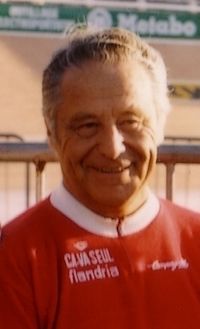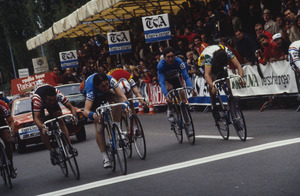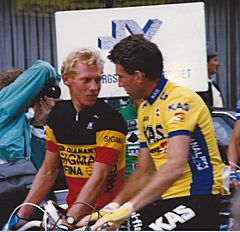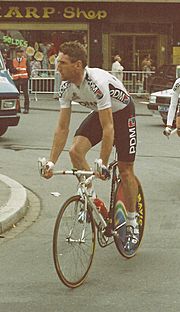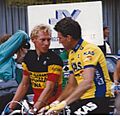Sean Kelly (cyclist) facts for kids
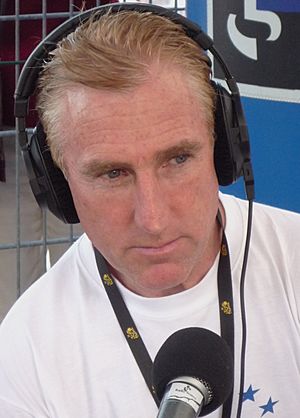
Kelly in 2009
|
|||
| Personal information | |||
|---|---|---|---|
| Full name | John James Kelly | ||
| Nickname | King Kelly | ||
| Born | 24 May 1956 Waterford City, County Waterford, Ireland |
||
| Height | 1.80 m (5 ft 11 in) | ||
| Weight | 77 kg (170 lb; 12 st 2 lb) | ||
| Team information | |||
| Current team | Retired | ||
| Discipline | Road | ||
| Role | Rider | ||
| Rider type | All-rounder | ||
| Major wins | |||
|
|||
John James 'Sean' Kelly (born 24 May 1956) is a famous Irish former professional road bicycle racer. He was one of the best cyclists in the 1980s. Many people consider him one of the greatest "Classics" riders ever. From 1977 until he stopped racing in 1994, he won 193 professional races. This includes nine "Monument Classics" and the Paris–Nice race seven times in a row. He also won the first UCI Road World Cup in 1989.
Kelly won one major "Grand Tour" race, the 1988 Vuelta a España. He also won the green jersey (points classification) four times in the Tour de France. He had many wins in races like the Giro di Lombardia, Milan–San Remo, Paris–Roubaix, and Liège–Bastogne–Liège. He came in second three times in the Tour of Flanders, which was the only Monument race he didn't win. He also won other important races like the Grand Prix des Nations and stage races such as the Critérium International, Tour de Suisse, Tour of the Basque Country, and Volta a Catalunya.
Kelly won bronze medals twice (in 1982 and 1989) at the Road World Championships. He was ranked World No.1 for a record five years in a row, starting in 1984. In 1984, Kelly won 33 races.
Contents
Sean Kelly's Early Life
Sean Kelly was born on 24 May 1956, in Waterford City, Ireland. His parents, Jack and Nellie Kelly, were farmers in Curraghduff, County Waterford. He was named John James Kelly, but everyone called him "Sean" to avoid confusion. "Seán" is the Irish way of saying John.
Sean went to Crehana National School for eight years. He cycled about a mile and a half to school with his older brother, Joe. Sean was very shy at school. He left school at 13 to help on the family farm. When he was 16, he started working as a bricklayer.
Starting Cycling as an Amateur
In September 1969, a new cycling club, Carrick Wheelers Road Club, visited Joe's school. They encouraged students to join a schoolboy cycling league. Joe joined and started winning races. Sean soon followed his brother and joined the club too.
On 4 August 1970, when Sean was 14, he rode his first race. It was an eight-mile handicap race. Sean started three minutes before the fastest riders, including his brother Joe. He won the race, staying three minutes ahead of everyone else.
In July 1972, at 16, he won the National Junior Road Championships. He won this title again in 1973. In 1974, at just 17, he started racing as a senior. He won the Shay Elliott Memorial Race that year. He also raced in the Tour of Ireland and the Tour of Scotland. He won ten races as a senior, even though he was still young enough to be a junior.
In 1975, Kelly won the Shay Elliott Memorial Race again. He won three stages of the 1975 Tour of Ireland. He also won a stage in the 1975 Tour of Britain. His performance caught the eye of John Morris, who helped French cycling clubs find new talent. This led to an offer for Kelly to join an amateur team in France, V. C Metz-Woippy.
A Trip to South Africa and a Ban
In late 1975, Kelly and two other Irish riders went to South Africa. They raced in the Rapport Toer to get ready for the 1976 Olympic Games. However, there was a ban on athletes competing in South Africa because of apartheid. So, they raced as a British team using fake names.
When the Irish Cycling Federation found out, Kelly and the others were banned from racing for seven months. This ban was later shortened to six months. Because of this, they were not allowed to compete in the 1976 Olympic Games.
Racing in France
After the Olympic dream was gone, Kelly wrote to Velo Club Metz in France. They offered him free housing, money each week, and free bike parts. Kelly accepted and moved to Metz in mid-1976. He won 18 of the 25 races he started there. His biggest win was the Piccolo Giro di Lombardia in Italy.
Kelly earned good money in France. He returned to Ireland with £800. He planned to go back to Metz for the 1977 season. He even convinced his friend Pat McQuaid to join him.
While Kelly was with Velo Club Metz, his talent caught the attention of Jean-Pierre Douçot. Douçot was a talent scout for Jean de Gribaldy, a team manager for the Belgian professional team, Flandria–Velda–Latina Assicurazioni. Kelly's win at the Piccolo Giro di Lombardia convinced de Gribaldy to sign him.
On 9 December 1976, de Gribaldy flew to Ireland to meet Kelly. He offered Kelly a contract for £4000 a year. Kelly thought about it and asked for £6000, which de Gribaldy agreed to. Sean Kelly officially became a professional cyclist with Flandria.
Sean Kelly's Professional Career
Starting as a Pro Cyclist
In January 1977, Kelly moved to Besançon, France, where he lived for two years. He shared an apartment with four teammates above a bike shop owned by de Gribaldy.
Flandria was a top Belgian cycling team. They wanted to expand into France, so they hired de Gribaldy to create a French team. This French team mostly raced in smaller French events. If riders did well, they could move up to the main Belgian team.
On 7 February 1977, Kelly raced his first professional event, the Étoile de Bessèges. He finished tenth in the first stage and third overall. On 6 March 1977, Kelly got his first professional win at the Grand Prix de Lugano in Switzerland.
His strong start got him promoted to the main Flandria team. He raced in the 1977 Paris–Nice as a helper for Freddy Maertens, who won the race. In May 1977, Kelly won his first stage in a major race, the Tour de Romandie. He also beat famous cyclist Eddy Merckx to win the Circuit de l'Indre race.
Kelly stayed with de Gribaldy's team in 1978. That year, he raced in his first Tour de France and won a stage. After that season, he joined a new team called Splendor, where he became a team leader.
Winning Big Races
Kelly was known as a great sprinter. His manager, de Gribaldy, believed he could win longer stage races too. He encouraged Kelly to lose weight and aim for overall wins. Kelly then won Paris–Nice in 1982, along with four stages. He also won the points classification in the Tour de France. He won a bronze medal at the 1982 World Championships, the first for an Irish rider since 1962.
In 1983, Kelly won Paris–Nice for the second time. He also won the Critérium International and his first Tour de Suisse. He won the points classification in the Tour de France again. He wore the famous yellow jersey in the 1983 Tour de France for one day. Later that year, he won his first "Monument" race, the Giro di Lombardia.
Kelly had an amazing year in 1984. He won Paris–Nice for the third time. He also won Paris–Roubaix and Liège–Bastogne–Liège. He won all three stages of the Critérium International. In total, Kelly won 33 races in 1984. He finished fifth in the Tour de France.
He won Paris–Nice again in 1985. He also won three stages in the Vuelta a España. He won the points classification in the Tour de France for the third time and finished fourth overall. At the end of 1985, he won the Giro di Lombardia again.
In 1986, Kelly won Milan–San Remo and Paris–Roubaix again. He is one of only four riders to win both these races in the same year. He also won Paris–Nice for the fifth time. He finished third in the Vuelta a España, winning two stages. He won over 30 races in 1986.
Kelly won his sixth Paris–Nice in 1987. He also won the Nissan Classic for the third time. In 1988, he won his seventh Paris–Nice in a row, which is a record. He also won Gent–Wevelgem.
Winning a Grand Tour
In April 1988, Kelly raced in the Vuelta a España. He started strong, winning sprint bonuses. On the second-to-last day, he was 21 seconds behind the leader. Kelly rode incredibly well in the time trial and took the yellow jersey. The next day, he won his only "Grand Tour" title. He also won the points competition in the Vuelta.
Later Career and Retirement
In 1989, Kelly joined the PDM–Ultima–Concorde team. He won Liège–Bastogne–Liège for the second time. He also won the points classification in the Tour de France for the fourth time. That year, he won the first ever UCI Road World Cup championship. He also won a bronze medal at the 1989 World Championships.
Kelly won the Tour de Suisse for the second time in 1990. In 1991, he broke his collarbone during Paris–Nice. Later that year, his team, PDM, had to leave the Tour de France because many riders were ill. After a family tragedy, Kelly returned to racing and won his fourth Nissan Classic. He also won the Giro di Lombardia for the third time.
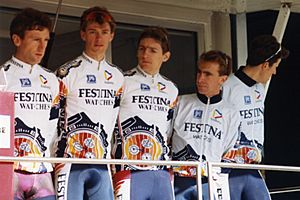
In 1992, Kelly moved to the Lotus–Festina team. He won Milan–San Remo for the second time, showing he was still a top rider. He also raced in the Giro d'Italia for the first and only time. He left the race after stage 16.
Kelly's last year as a professional was 1994. He rode for the Catavana team. He returned to his hometown of Carrick-on-Suir for his final professional race, the annual Hamper race. Many famous cyclists and even the President of Ireland, Mary Robinson, were there. Kelly won the race in a sprint against Stephen Roche.
Sean Kelly's Cycling Style
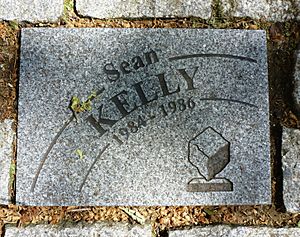
Sean Kelly raced during a time with many cycling legends. He competed against riders like Eddy Merckx, Bernard Hinault, Greg LeMond, and Laurent Fignon. He was known for being an "all-rounder," meaning he was good at many types of racing.
Unlike some sprinters who only wait for the end, Kelly could start attacks and climb hills well. He proved this by winning the Vuelta a España and a stage of Paris–Nice on the tough Mont Ventoux climb. His wins in Paris–Roubaix (1984, 1986) showed he was great in bad weather and on rough, cobbled roads. He could also keep up with the best climbers in the mountains of the Tour de France.
Kelly was also very good at riding downhill. He once reached a speed of 124 km/h (77 mi/h) going down a mountain in the Tour de France. He finished fourth in the Tour in 1985. He won the points classification in the Tour de France four times (1982, 1983, 1985, 1989). He also won five stages in the Tour de France and 16 stages in the Vuelta a España.
Kelly was also an excellent time trialist. In 1985, he set a record for the fastest average speed in a time trial longer than 20 km. This record stood for four years.
After Cycling
After retiring from racing, Sean Kelly became a cycling commentator. He works for TNT Sports (formerly Eurosport) and is known for his great insights into races. He comments on major events like the Tour de France, Giro d'Italia, and Vuelta a España.
He also started the Sean Kelly Cycling Academy in Belgium. In 2006, he launched Ireland's first professional cycling team, Sean Kelly ACLVB–M.Donnelly. The team helped many young riders, including Sam Bennett and Ryan Mullen, start their careers. The team stopped racing at the end of 2017.
Kelly also has a company that makes cycling clothes. He takes part in long-distance charity cycling tours to raise money for good causes. He often cycles with SportActive cycling holidays in Mallorca.
The first Sean Kelly Tour of Waterford was held in 2007. Kelly himself was one of the 910 people who took part. The event grew very popular, with over 8,000 cyclists participating in 2011. The tour ran every year until 2017.
Books About Sean Kelly
Sean Kelly is the subject of several books. These include KELLY A Biography of Sean Kelly by David Walsh (1986) and SEAN KELLY a man for all seasons by Sean Kelly and David Walsh (1991).
Sean Kelly also published his own story, called Hunger, in 2013.
Awards and Recognition
In December 1986, Sean Kelly won the RTÉ Sports Person of the Year Award. In 2005, he received the Mick Doyle Golden Memory Award. In November 2013, he received an Honorary Doctorate from Dublin City University for his contributions to Irish sport. In November 2019, he received a lifetime achievement award at the Cycling Weekly Awards in London.
Images for kids
-
Kelly (left) with the Festina–Lotus team at the 1993 Paris–Nice.
-
Plaque on the cobbled section, Espace Charles Crupelandt of the Paris–Roubaix, honoring Kelly's victories in 1984 and 1986.
See also
 In Spanish: Sean Kelly para niños
In Spanish: Sean Kelly para niños
- Irish cyclists
- Yellow jersey statistics
 | Aurelia Browder |
 | Nannie Helen Burroughs |
 | Michelle Alexander |


